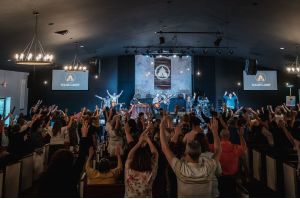Millennials most likely to fact check sermons, Barna study finds

Millennial-aged Christians are more likely than older generations to fact-check sermons while they are being preached, according to a new report by the Barna Group.
In a report titled “Do Americans Replace Traditional Church with Digital Faith Expressions?” that was released last week, Barna analyzed what American Christians do during a sermon.
While 75 percent of respondents said they “listen carefully,” 17 percent acknowledged that they “get distracted” while 10 percent reported that they “’fact check’ the sermon.”
Millennials were the generation with the highest percentage of respondents who said they fact-check, with 16 percent admitting that they do this, compared to 12 percent of Generation X and only 7 percent of Baby Boomers.
Millennial church attenders were also the most likely to report checking their social media, emails, and text messages during a sermon, with 17 percent responding that they do this.
This was larger than the 10 percent of Generation X who reported doing the same during a sermon and the 4 percent of Baby Boomers who responded the same.
A possible factor for this, according to Barna, is that younger church attendees are likely “more device-dependent” than older attendees.
“It’s possible that, for more device-dependent younger generations, having a smartphone or tablet on hand during church simply feels normal, another opportunity to either aid or diminish their engagement with a sermon,” explained Barna.
“In the same way, for an older Christian, a spiralbound notebook might become a sermon staple for writing down notes or just doodling in the margins—and, in fact, Boomers are less likely than younger generations to be taking notes during a service.”
Barna found that all generations reported being distracted virtually equally, with 17 percent of millennials, 16 percent of Gen X, and 17 percent of Boomers reporting this.
Data for the report was drawn from an online national public opinion survey Barna conducted among 1,606 adults in the United States, collected between Dec. 5-18, 2019, with a nationally representative panel and a margin of error of +/- 2.2 percent.
Barna President David Kinnaman said in a statement released last week that he found the data promising, as it showed that millennials were using digital devices “to grow spiritually,” such as listening to a sermon a podcast.
“It’s to be expected that as technology transforms society, impacting even the simplest of daily activities, younger generations will find new ways to harness these tools—including for spiritual growth, faith sharing and church engagement,” said Kinnaman.
“As they do so, church leaders can respond by providing thoughtful integration of digital tools, strategies and content into their spiritual development efforts.”
The report was part of Barna’s State of the Church 2020 project, which was aimed at helping churches more effectively plan out their ministries.
“State of the Church gives you a deeper understanding of the challenges and opportunities facing the Church and delivers practical solutions for growth and improvement to help your people to flourish and your ministry to thrive,” said Barna regarding the project.
In 2016, Sam Eaton, founder of a suicide prevention ministry called Recklessly Alive, wrote a viral blog post explaining why he believed fellow millennials were “over church.”
Among his reasons, one that he cited as an example was “preaching,” arguing that it “just doesn't reach our generation like our parents and grandparents.”
“We have millions of podcasts and YouTube videos of pastors the world over at our finger tips,” wrote Eaton at the time.
“Millennials crave relationship, to have someone walking beside them through the muck.”
“If we don't have real people who actually care about us, why not just listen to a sermon from the couch?”





























